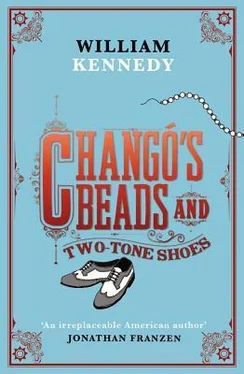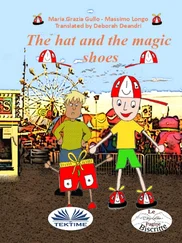“On the way to Fidel.”
“How did you do it?”
“Alfie was superb, I’ll tell you all about it. He’s quite clever, and fearless.”
“He seems to be a first-class criminal.”
“It’s nice to meet one who isn’t in politics.”

The army flew the press back to Santiago airport from El Macho’s landing field, and Quinn took a taxi to the Casa Granda to call in his story. It was mid-afternoon when he got to the room and he found Renata gone. His phone message that he’d be here in an hour had been delivered but lay unopened on the floor. Her purse and all her clothes were here, no note. He called Max with his story and told him Hemingway wasn’t interested in the duel, so it was back to Cooney — go public if that’s what you want.
“If he does go public Hemingway will have to come up with some sort of reply.”
“No, he won’t. He’s Hemingway.”
“He’ll look like he’s afraid.”
“He’s in mourning for his dog. And his writing isn’t going well. He said if he wanted to die he’d do it himself.”
“Is that his statement?”
“Not really. But he said it, and a lot more. But no.”
“I’ll tell Cooney.”
Quinn dictated his army story to the desk man he had seen on his first visits to the Post, a black Americano named Julian Stewart, a New York actor and aspiring playwright with a Cuban wife, who edited copy and did layout. He laughed at Quinn’s paragraph on the fluctuating army death tolls in the battle with Fidel and he told Quinn, “You should go to Fidel and get the real total.” Quinn agreed that was a good idea. “Tell him I said hello,” Julian said, “and I’m available if he needs help.”
Quinn flopped on the bed, nothing to do till Renata connected to the Holtzes. He raised his memory of her at their first meeting in El Floridita with Hemingway. Amazing, stunning, incomparable. Quinn now decided he would marry her before they left Oriente province. He was absolutely firm on this, but he also decided he would not tell her. He would make his plan public only when necessary; yet it was real in his imagination and now he needed only to actualize it. The ceremony would require no priest to sanctify it, no judge to make it legal. A babalawo would do, even if the union was legitimate only in Yoruba; for Renata saw the babalawo as a comfort figure. Quinn believed she was not yet aware how ready she was to marry him. The intensity of what he felt for her was without precedent, and her reaction to him certainly seemed strong. Her grief at losing Diego was enormous, but in its freshest hours she slept alongside Quinn in his bed; and in the wake of the Quesada murder she took revenge on the caprice that killed her love and gave herself to Quinn, transforming them both. She is a creature of perpetual intensity and mystical need, a nymph who could betray you in a blink with a stranger, if that act lit the flame that lights her days. You have an aberration wrapped into your life, Quinn, a walking, loving astonishment. Marry her quickly. She will understand your perception and will accept. Twice in the brief time you’ve known her she has admitted the possibility of marrying you someday, and she will accept now because of your persuasively absurd insistence. She is love insatiable but she has never accepted long life with her other lovers, who have all had the life expectancy of mayflies, products of her youthful misjudgment, her proclivity for fractured dreams, and her co-conspiracy in creating wrenching separations. You are a gift from an Orisha that arrived during her craving for something beyond the sexual fadeaways of her commonplace book of love, and your impromptu marriage scheme looms as a gesture any Orisha would respect, bespeaking your fluency in the language of the soul.
But be aware, Quinn — Renata does not yet know she knows these things, and you certainly should not push her to premature awareness, for she may make a hasty mess and bend everything to her adorational needs of the moment. Let her discovery arrive during your next eureka moment together, which should be soon. Do not tell her that she wants to marry you above all her other lovers past or present. Do not spoil her surprise.

Renata waiting for Felipe: another of the Holtz family taking in another of the Otero women. He would soon drive her to his mansion where her mother, Celia, had been taken in and raised, and where Renata visited as a child, never quite understanding back then why this had happened. But she had exotic memories of vacations here with her cousins, of games played in their vast house and in the stables and outbuildings, with secret hiding places and cuddling until they found you, early intimations of romance, which seemed to be what they called it. Whatever it was those visits were always too brief, always interrupted, and always with that hovering mystery no one talked about but everyone (except Renata) knew — the secret life of her grandmother.
She sat at the first table in the café, near the door, and ordered a coffee. The waiter had a large scar on his neck, a rope burn from being hanged? Remnant of a murderous throat-slitting? But, Renata, might it not have been accidental? No. Something so egregious is rarely accidental in Cuba. She saw her Grandmother Margaret’s hooded eyes, and her scarred eyelids, and don’t try to tell Renata that was accidental. She conjured the face she knew from young photographs before the eyes were attacked. Such a wild creature, Margarita Lastra Pujol de Otero, who came to Cuba on a tidal wave of passion, unable to live without her husband of a few months, Jaime, who had left her in Spain in 1896 to join the war against Cuban rebels, also to elevate his military status, war can do that for a privileged young prince of a wealthy family.
Renata was now sitting a few blocks from where Margarita, with her year-old Celia, had first lived in this city while Jaime was making forays into rebel territory. Her townhouse belonged to Jaime’s uncle, Sebastian Holtz Otero, who derived his wealth from one of the few sugar mills to survive three wars in Oriente Province. Jaime came there twice to be with her, brief visits but wild with conjugal frenzy and bliss and such emotional consummation that he composed a will against the day he might die in war, giving her all he owned or might inherit. What he asked in return was her eternal love and fidelity, which she granted with the first blink of her eye, her worship of his penstroke and sexual fury, his teardrop on the letter, his mouth on her own and on her body and on the spiritual lips of her love. You will kiss me everywhere and forever, she wrote him. In these days he sent her three letters, all he could manage, but they were very like the twenty-seven he’d written when courting her: passionate, even shocking. They burned her imagination; she thrived on their heat.
Renata wanted to receive letters like those. As she grew older she heard her parents talk of them, then found the key to the strongbox where Celia had hidden them, because such things were not fit for young eyes. Renata sat and read them all, her first schooling in the language of sex and the thrilling persiflage of love. She wanted to own the letters but her mother discovered her reading them and put them in a bank vault, telling her: When you are ready.
Renata was ready now. She wanted to read them again, see farther into those words that had shaped an obsession in her grandmother. She wanted to walk to the town house, which was still there, for it would put flesh on her memory. Here is where it all happened, here the point of tragedy of the solitary young mother who one day hears Uncle Sebastian say Jaime has died in battle, nobly. In fact his head had been split in half by a machete stroke. Renata imagined the fall of her grandmother’s spirit, her instantly cracked heart, her life suddenly without meaning. Margarita did withdraw, her agony turning to delirious flights of conversation with the dead; and she seemed to have forgotten that the baby Celia existed. Jaime’s uncle, whom she rarely saw and who lived on the Holtz estate in Palma Soriano, monitored her condition through daily briefings from the nana he sent to care for mother and child.
Читать дальше














